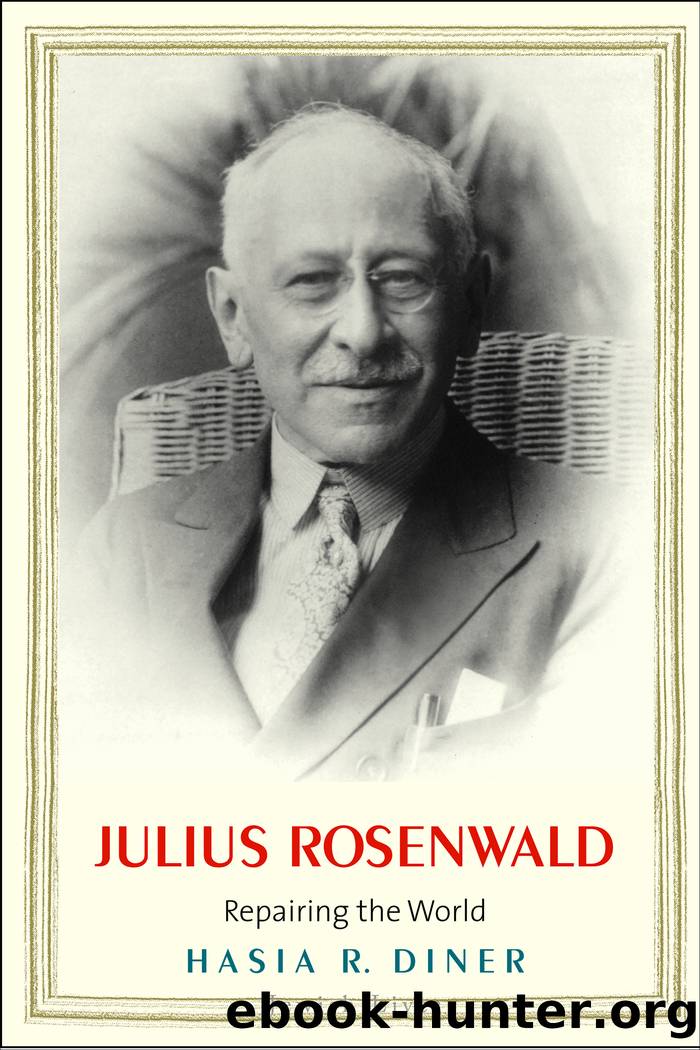Julius Rosenwald by Hasia R. Diner

Author:Hasia R. Diner
Language: eng
Format: epub
Publisher: Yale University Press
Published: 2017-09-15T00:00:00+00:00
4
A Jew Steps In
IN 1924, the American Israelite challenged Henry Fordâs anti-Semitic and xenophobic outpourings with a small piece. âHereâs an item for Fordâs Folly,â it mocked: âa group of Nordics in the Southâwhite 100 percent, American money-lendersâwere about to stop Herman E. Perry, Negro financier of Atlanta . . . when a JEW by the name of Julius Rosenwald stepped in.â Rosenwald offered to rescue Perryâs business, the Atlanta Life Insurance Company, from certain death. The American Israeliteâs designations âNordicsâ and â100 percentâ Americans took aim at a common 1920s anti-immigrant trope, and when it then identified them as âmoney-lenders,â it subverted the centuries-old condemnation of Jews as usurers. After all, a âJEWâ had demonstrated to the white Georgia Christians the meaning of generosity.1
The piece highlighted the prominence of Julius Rosenwald, the one who âstepped inâ to assist Perryâs business, in initiatives aimed at ameliorating the dire economic conditions endured by black Americans. Rosenwald knew Perry and admired him. He also felt that if the bank failed, black people in Atlanta and elsewhere would suffer. Much of Rosenwaldâs philanthropic and civic activism revealed a disposition to step in and act for and with Americaâs black population, who were largely living in extreme poverty, lacking access to basic services offered by private institutions and denied the basic rights guaranteed by governments, local, state, and federal, to American citizens.
Julius Rosenwaldâs name had been linked to black causes since the early twentieth century, and many Americans knew of his dedication to lessening inequalities between blacks and whites and addressing the nationâs deliberate failures. In his work for âthe Negro,â his Jewish self-image and worldview played a large role.
Shortly after Rosenwaldâs death in 1932, the philosopher Alain Locke, a leading voice of the Harlem Renaissance and author of the pathbreaking anthology The New Negro (1925), eulogized the philanthropistâs life and work. In a few pages, Locke summarized charitable giving in general, American democracy, the status of African Americans, Jewishness, and the bonds connecting Jews and blacks, as he contemplated the âbenefactions of Julius Rosenwald . . . a man who discovered a new social and spiritual dimension for the philanthropistâs dollar.â Rosenwald, with his distinctive brand of charitable giving and his focus on âthe Negro,â had become, according to Locke, a âpatron of democracy.â2
Why did Locke, the chair of the Philosophy Department at Howard University, a beneficiary of Rosenwaldâs philanthropic work, equate JRâs philanthropy with working for democracy? Locke noted that much of American philanthropy contained within it âun-American elements,â given the âbureaucratic trend of the self-perpetuating foundation and the enfeebling effect of private giving to social objectives that should be recognized clearly as public or state responsibilities.â This predominant form of American philanthropy did not alter social realities, but perpetuated them while alleviating some immediate problems temporarily.
But JRâs insistence that beneficiaries of philanthropy, such as the millions of southern blacks who lived in communities which housed âRosenwald schoolsâ or African American men around the country who spent leisure time at the YMCAs
Download
This site does not store any files on its server. We only index and link to content provided by other sites. Please contact the content providers to delete copyright contents if any and email us, we'll remove relevant links or contents immediately.
Machine Learning at Scale with H2O by Gregory Keys | David Whiting(4289)
Never by Ken Follett(3931)
Harry Potter and the Goblet Of Fire by J.K. Rowling(3842)
Unfinished: A Memoir by Priyanka Chopra Jonas(3370)
Fairy Tale by Stephen King(3366)
The Man Who Died Twice by Richard Osman(3065)
Will by Will Smith(2904)
Rationality by Steven Pinker(2349)
It Starts With Us (It Ends with Us #2) by Colleen Hoover(2332)
Can't Hurt Me: Master Your Mind and Defy the Odds - Clean Edition by David Goggins(2319)
The Dark Hours by Michael Connelly(2299)
The Storyteller by Dave Grohl(2224)
Friends, Lovers, and the Big Terrible Thing by Matthew Perry(2211)
The Dawn of Everything: A New History of Humanity by David Graeber & David Wengrow(2186)
The Becoming by Nora Roberts(2185)
The Stranger in the Lifeboat by Mitch Albom(2110)
Cloud Cuckoo Land by Anthony Doerr(2089)
Love on the Brain by Ali Hazelwood(2055)
Einstein: His Life and Universe by Walter Isaacson(2005)
